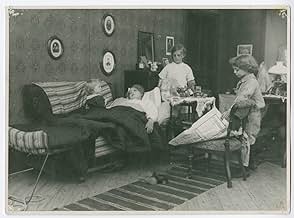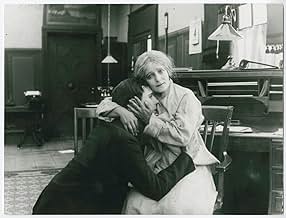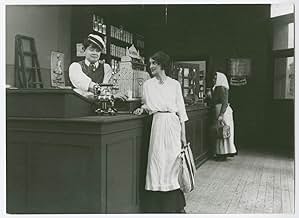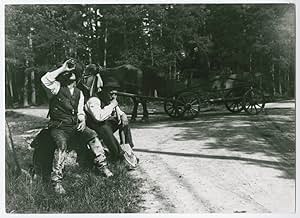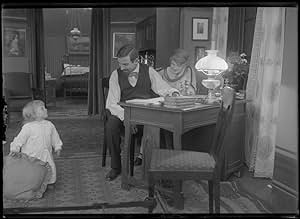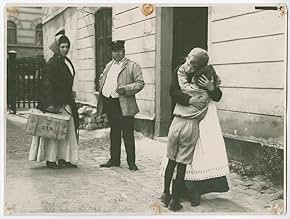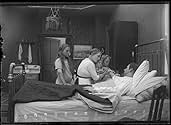VALUTAZIONE IMDb
7,0/10
1550
LA TUA VALUTAZIONE
Aggiungi una trama nella tua linguaFinancial struggles separate a single mother from her children.Financial struggles separate a single mother from her children.Financial struggles separate a single mother from her children.
- Regia
- Sceneggiatura
- Star
Recensioni in evidenza
The Holms are a happy Swedish family who live an easy bourgeoisie life. In order to further improve their living, Herr Sven Holm requests a line of credit in the amount of 10.000 kronor in order to open a grocery shop.
Unfortunately things will change drastically for the Holms when Herr Sven falls ill with tuberculosis and dies. The grocery store, in the meanwhile, was left improperly unattended by an employee. Frau Ingeborg Holm is left bankrupt and alone with her three small children. This forces her to ask for help in a poorhouse.
Sweden has contributed to mankind some debatable inventions. For example, there's the safe but unstylish tank automobiles made in that Northern country ( nothing in common with elegant "Hispano-Suiza" cars )... or.. that modernen and consequently, ugly furniture manufactured in pieces that the buyer must to try to assemble ( ah, the "Rococo" overloaded style! ) ...or ...with not a trace of a four string quartets, the Swedish instead tormented aristocracy with bands of four longhaired youngsters singing tunes that even today are popular among commoners But certainly the most important Swedish contribution to the whole world was Social Security for their population via a program that provides protection to their commoners with unemployment insurance, poverty protection and pensions, among others. It's a public welfare state that other countries will model years later.
But unfortunately things weren't always that way as Herr Victor Sjöström depicted in his early silent film "Ingeborg Holm", directed by the Swedish director in the silent year of 1913.
The film was based on a play by Herr Nils Krok, who can be seen posing as the film starts in an elegant old photograph ( nothing in common with the coloured ones that the youngsters put in their modernen profiles ). The picture version tells the human tragedy of Frau Ingeborg Holm, who due to circumstances and the blows of fate, will face destitution. Her personal drama is worsened by the unsympathetic and strict poorhouse rules that during the last centuries were applied by Swedish officialdom.
Herr Sjöström admirably depicts the process of loss that affects Frau Holm's life and her desperation, abandonment, helplessness and finally insanity. It's a terrible sad odyssey that Frau Holm will suffer and includes making heartbreaking decisions such as when she is forced to put her children in an orphanage.
Certainly "Ingeborg Holm" is not an easy film. It is an uncomfortable drama in which Herr Sjöström denounces in a realistic and harsh way the injustice caused by strict central government laws that have no concern for their subjects.
Such bitterer sensations continue during the whole film climaxing at the end of the picture when Frau Holm, after 15 years, reunites again with one of her sons. This is a wonderful scene full of infinite sadness and very moving ( at this point it must be said that the original music score composed and performed by Herr David Drazin for the longhaired "Kino" modernen disc edition, is absolutely touching and elegant ).
But this is not a happy ending because there is no comfort in this reunion; there is not a chance in recovering the happy old days when times were better for Frau Holm and her three children. Instead Frau Holm has lived a miserable life in where everything she had and loved was destroyed. Herr Sjöström depicts a desperate, hard and moving portrait of a ruined life.
And now, if you'll allow me, I must temporarily take my leave because this German Count must pay a visit to his aristocratic fostered parents.
Unfortunately things will change drastically for the Holms when Herr Sven falls ill with tuberculosis and dies. The grocery store, in the meanwhile, was left improperly unattended by an employee. Frau Ingeborg Holm is left bankrupt and alone with her three small children. This forces her to ask for help in a poorhouse.
Sweden has contributed to mankind some debatable inventions. For example, there's the safe but unstylish tank automobiles made in that Northern country ( nothing in common with elegant "Hispano-Suiza" cars )... or.. that modernen and consequently, ugly furniture manufactured in pieces that the buyer must to try to assemble ( ah, the "Rococo" overloaded style! ) ...or ...with not a trace of a four string quartets, the Swedish instead tormented aristocracy with bands of four longhaired youngsters singing tunes that even today are popular among commoners But certainly the most important Swedish contribution to the whole world was Social Security for their population via a program that provides protection to their commoners with unemployment insurance, poverty protection and pensions, among others. It's a public welfare state that other countries will model years later.
But unfortunately things weren't always that way as Herr Victor Sjöström depicted in his early silent film "Ingeborg Holm", directed by the Swedish director in the silent year of 1913.
The film was based on a play by Herr Nils Krok, who can be seen posing as the film starts in an elegant old photograph ( nothing in common with the coloured ones that the youngsters put in their modernen profiles ). The picture version tells the human tragedy of Frau Ingeborg Holm, who due to circumstances and the blows of fate, will face destitution. Her personal drama is worsened by the unsympathetic and strict poorhouse rules that during the last centuries were applied by Swedish officialdom.
Herr Sjöström admirably depicts the process of loss that affects Frau Holm's life and her desperation, abandonment, helplessness and finally insanity. It's a terrible sad odyssey that Frau Holm will suffer and includes making heartbreaking decisions such as when she is forced to put her children in an orphanage.
Certainly "Ingeborg Holm" is not an easy film. It is an uncomfortable drama in which Herr Sjöström denounces in a realistic and harsh way the injustice caused by strict central government laws that have no concern for their subjects.
Such bitterer sensations continue during the whole film climaxing at the end of the picture when Frau Holm, after 15 years, reunites again with one of her sons. This is a wonderful scene full of infinite sadness and very moving ( at this point it must be said that the original music score composed and performed by Herr David Drazin for the longhaired "Kino" modernen disc edition, is absolutely touching and elegant ).
But this is not a happy ending because there is no comfort in this reunion; there is not a chance in recovering the happy old days when times were better for Frau Holm and her three children. Instead Frau Holm has lived a miserable life in where everything she had and loved was destroyed. Herr Sjöström depicts a desperate, hard and moving portrait of a ruined life.
And now, if you'll allow me, I must temporarily take my leave because this German Count must pay a visit to his aristocratic fostered parents.
Ingeborg Holm / Margaret Day (1913) :
Brief Review -
Master Victor Sjöström's Swedish Melodrama is one of the earliest notable works about a mother's Tragedy in the cinema world. I am a big fan of Victor Sjöström and his prominent classics from the 1920s decade. It gives me an immense pleasure to view his early films, which were made on basic formulas as per the requirements and understanding of the era. Ingeborg Holm forced me to think about all the films based on Mother's tale, and I quickly realised how influential it was. It was much before Chinese cinema made "SheNu" / "The Goddess" (1934) and Indian cinema made the classic "Aurat" (1940). However, Holm's story is not that broad. It sticks to the basics while dealing with a relatable and emotional topic like motherhood. When I tried to find out the similarities between this film and other ones, I found the Marathi film "Chimni Pakhare" close to it, but then the main character had to go through different conflicts. The best close answer was the Telugu flick, "Jeevana Jyothi" (1975), which also had a double role boost. Imagine, a film from the 1910s decade influencing modern well-known films. The film is about a mother with three children who had to send her children to foster homes due to the financial crisis after her husband's death. The insanity angle is also used well by mixing it with high-end melodrama. I remember Hilda Borgström from Victor's "The Phantom Carriage" (1921), but today I noticed that her face and expressions are familiar with those of Lillian Gish. Her face kept reminding me of Gish, who also happened to work during the same period of time. Victor Sjöström's film has everything to make a classy watch, but it missed the classic tag by just an inch, in my opinion. Nevertheless, a great work from the early stages of movies that set many iconic formulas once and for all.
RATING - 7.5/10*
By - #samthebestest.
Master Victor Sjöström's Swedish Melodrama is one of the earliest notable works about a mother's Tragedy in the cinema world. I am a big fan of Victor Sjöström and his prominent classics from the 1920s decade. It gives me an immense pleasure to view his early films, which were made on basic formulas as per the requirements and understanding of the era. Ingeborg Holm forced me to think about all the films based on Mother's tale, and I quickly realised how influential it was. It was much before Chinese cinema made "SheNu" / "The Goddess" (1934) and Indian cinema made the classic "Aurat" (1940). However, Holm's story is not that broad. It sticks to the basics while dealing with a relatable and emotional topic like motherhood. When I tried to find out the similarities between this film and other ones, I found the Marathi film "Chimni Pakhare" close to it, but then the main character had to go through different conflicts. The best close answer was the Telugu flick, "Jeevana Jyothi" (1975), which also had a double role boost. Imagine, a film from the 1910s decade influencing modern well-known films. The film is about a mother with three children who had to send her children to foster homes due to the financial crisis after her husband's death. The insanity angle is also used well by mixing it with high-end melodrama. I remember Hilda Borgström from Victor's "The Phantom Carriage" (1921), but today I noticed that her face and expressions are familiar with those of Lillian Gish. Her face kept reminding me of Gish, who also happened to work during the same period of time. Victor Sjöström's film has everything to make a classy watch, but it missed the classic tag by just an inch, in my opinion. Nevertheless, a great work from the early stages of movies that set many iconic formulas once and for all.
RATING - 7.5/10*
By - #samthebestest.
I dont know if netflix got involved before or after the restoration .but this a great achievement for1913 may be I'm a wimp but the end made me cry. More like this netflix please
Again, this is an early not-that-bad drama from Sjostrom about a person driven mad by tragic circumstances. It has a nice sense of restraint, especially for its era, with a fine performance by Hilda Borgstrom and a well-paced story. Nothing about the movie sucks. It just takes a little something extra for me to get involved with a silent film... some sort of avant-garde twist or dazzling technique or some thrilling action. Yeah, it's a good plot with a sympathetic protagonist, but my heart just wasn't in it. I can't imagine anyone besides a Sjostrom scholar watching this more than once.
6/10
6/10
Victor Sjöström's early feature film "Ingeborg Holm" is not only considered by many the first film in the golden age of Swedish cinema lasting from 1913 to 1924 but also the real beginning of Swedish cinema in general. A film scholar, Peter Cowie, for one, claims that the film marks the highest achievement of the seventh art before David Wark Griffith's "The Birth of a Nation" (1915) which was to follow two years after. Although "Ingeborg Holm" is not as well known as many of its contemporary films, it surely stands out from the crowd to anyone who has seen more than a few films from the period. "Nothing like this was being made in 1913," writes Peter von Bagh, a Finnish film historian, capturing the historical importance of the film. The film's authenticity, realism, and moral seriousness have even been seen to bear far-reaching connections to Italian neorealism.
As many of the films of the Swedish golden age, "Ingeborg Holm" is also based on a literary source. It is based on a play by Nils Krok. The story concerns a married woman, Ingeborg Holm whose husband dies just after earning credit for establishing his own business. After the death of her husband, Ingeborg falls to the bottom of the society, loses her children to foster parents, and eventually ends up in an asylum.
The film is very raw and poignant in showing the grim consequences of social actions. It never, however, turns its back on the individual. Although it can be seen as a story of one woman's abasement, it grows into an intimate treatise on the sickness of a society that lacks humanity and tenderness. The shot of Ingeborg losing her children as a bureaucratic official calmly signs the documents in the background is definitive to say the least. The social reality as well as the psychological turmoil and suffering ignored by the society are relayed in a stark and riveting fashion. The scene bears a visual parallel to an earlier scene in which Ingeborg's husband dies in the foreground, while their children are innocently playing in the background of the image -- in another space, almost as if in another time, too.
Already the first film of the movement gives us its basic lessons: acting is more realistic than theatrical (to as large an extent as one can imagine given the film was made in 1913), moral themes are presented with the utmost seriousness, and emphasis lies on the simplicity and careful precision of mise-en-scène. Above all, the power of light is vital which was to be consummated in Sjöström's subsequent films such as "Terje Vigen" (1917) and "Körkarlen" (1921). In the beginning of the film, Ingeborg tries to continue her late husband's business, but fails, and we see the darkness in the grocery store almost swallowing her whole from the scarce source of light in the space.
Overall, and quite surprisingly, "Ingeborg Holm" lacks a sentimental or overly melodramatic tone. Sjöström's tone is subtle and restraint which once again reminds one of Italian neorealism. Although the film has no drama of nature which one so closely associates with the golden age of Swedish cinema, it uses a lot of outdoor on-location shooting, and its grimness, sobriety, and artistic excellence bring the style of the movement to mind very vividly. All in all, the film stands as a perfect instance for Peter Cowie's seemingly exaggerated claim that "there is no more stirring feat in the entire history of silent film than the Swedish achievements between 1913 and 1921." Sjöström's "Ingeborg Holm" is precisely this to any film enthusiast: something utterly stirring.
As many of the films of the Swedish golden age, "Ingeborg Holm" is also based on a literary source. It is based on a play by Nils Krok. The story concerns a married woman, Ingeborg Holm whose husband dies just after earning credit for establishing his own business. After the death of her husband, Ingeborg falls to the bottom of the society, loses her children to foster parents, and eventually ends up in an asylum.
The film is very raw and poignant in showing the grim consequences of social actions. It never, however, turns its back on the individual. Although it can be seen as a story of one woman's abasement, it grows into an intimate treatise on the sickness of a society that lacks humanity and tenderness. The shot of Ingeborg losing her children as a bureaucratic official calmly signs the documents in the background is definitive to say the least. The social reality as well as the psychological turmoil and suffering ignored by the society are relayed in a stark and riveting fashion. The scene bears a visual parallel to an earlier scene in which Ingeborg's husband dies in the foreground, while their children are innocently playing in the background of the image -- in another space, almost as if in another time, too.
Already the first film of the movement gives us its basic lessons: acting is more realistic than theatrical (to as large an extent as one can imagine given the film was made in 1913), moral themes are presented with the utmost seriousness, and emphasis lies on the simplicity and careful precision of mise-en-scène. Above all, the power of light is vital which was to be consummated in Sjöström's subsequent films such as "Terje Vigen" (1917) and "Körkarlen" (1921). In the beginning of the film, Ingeborg tries to continue her late husband's business, but fails, and we see the darkness in the grocery store almost swallowing her whole from the scarce source of light in the space.
Overall, and quite surprisingly, "Ingeborg Holm" lacks a sentimental or overly melodramatic tone. Sjöström's tone is subtle and restraint which once again reminds one of Italian neorealism. Although the film has no drama of nature which one so closely associates with the golden age of Swedish cinema, it uses a lot of outdoor on-location shooting, and its grimness, sobriety, and artistic excellence bring the style of the movement to mind very vividly. All in all, the film stands as a perfect instance for Peter Cowie's seemingly exaggerated claim that "there is no more stirring feat in the entire history of silent film than the Swedish achievements between 1913 and 1921." Sjöström's "Ingeborg Holm" is precisely this to any film enthusiast: something utterly stirring.
Lo sapevi?
- QuizNoted as the first true narrative film, its remarkable narrative continuity would characterize the style now known as classical Hollywood, which dominated the global film industry for the majority of the century.
- ConnessioniFeatured in Victor Sjöström - ett porträtt av Gösta Werner (1981)
I più visti
Accedi per valutare e creare un elenco di titoli salvati per ottenere consigli personalizzati
Dettagli
- Tempo di esecuzione
- 1h 36min(96 min)
- Mix di suoni
- Proporzioni
- 1.33 : 1
Contribuisci a questa pagina
Suggerisci una modifica o aggiungi i contenuti mancanti

